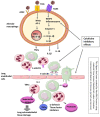Colchicine Against SARS-CoV-2 Infection: What is the Evidence?
- PMID: 35107804
- PMCID: PMC8808271
- DOI: 10.1007/s40744-022-00425-0
Colchicine Against SARS-CoV-2 Infection: What is the Evidence?
Abstract
Coronavirus disease 2019 (COVID-19) caused by the severe acute respiratory syndrome coronavirus 2 (SARS-CoV-2) is a matter of concern worldwide and a huge challenge for rheumatologists. Indeed, several antirheumatic drugs are currently used at different stages of COVID-19, such as several cytokine inhibitors and colchicine. Colchicine is one of the oldest medicines with potent anti-inflammatory properties. In rheumatic diseases it is widely used for the treatment of gout, calcium pyrophosphate deposition disease, and familial Mediterranean fever. It is also used off-label in cardiology to treat atrial fibrillation, pericarditis, and myocardial infarction. Over the last few years, advances in the understanding of colchicine's mechanism of action and its pharmacology and safety have made colchicine a promising candidate agent for the fight against COVID-19. In this review, we discuss COVID-19 pathophysiology highlighting colchicine's mode of action, its pleiotropic effects on neutrophils, inflammasome inhibition, and its viral activity. Finally, we discuss the main clinical studies dealing with the use of colchicine in COVID-19. Given the large body of evidence that demonstrates its effectiveness, safety, and its simple way of administration, colchicine seems to be a promising drug to reduce the risk of severe COVID-19 disease.
Keywords: COVID-19; Colchicine; Cytokine release syndrome; FMF; Gout; Inflammasome; Neutrophils; SARS-CoV-2 infection.
© 2022. The Author(s).
Figures


References
-
- Gianfrancesco M, Hyrich KL, Al-Adely S, et al. Characteristics associated with hospitalization for COVID-19 in people with rheumatic disease: data from the COVID-19 Global Rheumatology Alliance physician-reported registry. Ann Rheum Dis. 2020;79(7):859–866. doi: 10.1136/annrheumdis-2020-217871. - DOI - PMC - PubMed
-
- Ferro F, Elefante E, Baldini C, et al. COVID-19: the new challenge for rheumatologists. Clin Exp Rheumatol. 2020;38(2):175–180. - PubMed
-
- Sepriano A, Kerschbaumer A, Smolen JS, et al. Safety of synthetic and biological DMARDs: a systematic literature review informing the 2019 update of the EULAR recommendations for the management of rheumatoid arthritis. Ann Rheum Dis. 2020;79(6):760–770. doi: 10.1136/annrheumdis-2019-216653. - DOI - PubMed
Publication types
LinkOut - more resources
Full Text Sources
Miscellaneous

